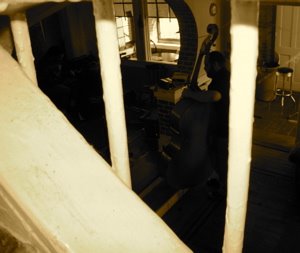Working with one of the National Writing Project's sites was one of the highlights of my graduate work. The project has sites all over the U.S. focused on making educators better teachers of writing by getting them writing for themselves. One of the goals of the site I worked with was to put together a magazine/newsletter, but teacher schedules being what they are, the publication never materialized. I was going to contribute a column on writing, reading, and education.
I finished one piece and it is below. It's written in a voice that I felt would be appropriate for the audience of other teachers. For me, it felt like I was taking a chance writing in a way that I generally don't. Anyway, you can read it and judge whether or not it's successful.
Book lists fascinate me and so I wrote the first column in response to a Bradbury essay I had read and combined that with a book list exercise. Now, when I look at my list, I think about how uneventful that list is. I mean, I could add some Nabokov, Melville, Twain, Flaubert, or Wharton, or maybe exchange The Stranger with The Plague, but it would still be a dry, dusty list. What can I say? A fascination with book lists makes me read from those lists.
Do you remember the first book you ever read? I don't. Do you remember the first book you read twice? It was Robinson Crusoe for me. Now, could you outline, not simply, but in detail, that book? Not my book, but your first book, or even your favorite book? I couldn't. My detailed retelling of Robinson Crusoe might look something like this: Crusoe shipwrecks on an island. He journals. He meets a guy named Friday. Crusoe had a beard on the cover, but I'm not sure if he already had it or grew it on the island. Pretty shabby for a book I've actually read more than once, but this leads me to an interesting challenge posed by Ray Bradbury.
In 2004, Bradbury wrote an article published in the Wall Street Journal entitled "Remembrance of Books Past." If you've never judged Bradbury a skilled writer, consider the sentence that ends his article: "Go find your bliss, name your favorites, and see if your long umbilical memory has been cut or you are still wonderfully tied to the things you loved in libraries a long time ago." What Bradbury is referring to is a literary parlor game that we as writers, readers, or teachers can play or modify for our students.
It all started over dinner, when Bernard Berenson, a famed Renaissance art historian, suggested a sequel to Fahrenheit 451 in which the Wilderness People, who memorized books in order to not get caught with the outlawed items, would now, at a much later and freer time, reprint books from their collective memory.
Sounds like a great story, right? Bradbury thought so, but his outline of the novel never came to be. Fifty years later, though, having stumbled upon his notes about the novel and his conversation with Berenson at dinner, he wrote the article and suggested, as an exercise or parlor game, that we take up Berenson's challenge ourselves. Bradbury suggests "List your 10 favorite novels, and, in great detail, outline their plots, then renew your acquaintance with these to find out how you have scarred, beautified, or mutilated those incredible books."
What a challenge to us as readers, writers, and teachers! Even if you don't try to outline in detail your 10 favorite novels, you could still use this idea in class. For one, you could show students the difference between blurbs, outlines that retell sequences of events, and summaries. As a type of review, the class could reacquaint themselves with the events from Shakespeare plays or Twain novels.
What are your 10 favorite novels? Make a list of them and share the list with your students, maybe they'll make their own lists, too.
Here's mine:
1984--George Orwell
Pride and Prejudice--Jane Austen
Ulysses--James Joyce
The Metamorphosis--Franz Kafka
The Haunting of Hill House--Shirley Jackson
The Stranger--Albert Camus
Beloved--Toni Morrison
As I Lay Dying--William Faulkner
The Sound and the Fury--William Faulkner
A Journal of the Plague Year--Daniel Defoe
Subscribe to:
Post Comments (Atom)

No comments:
Post a Comment